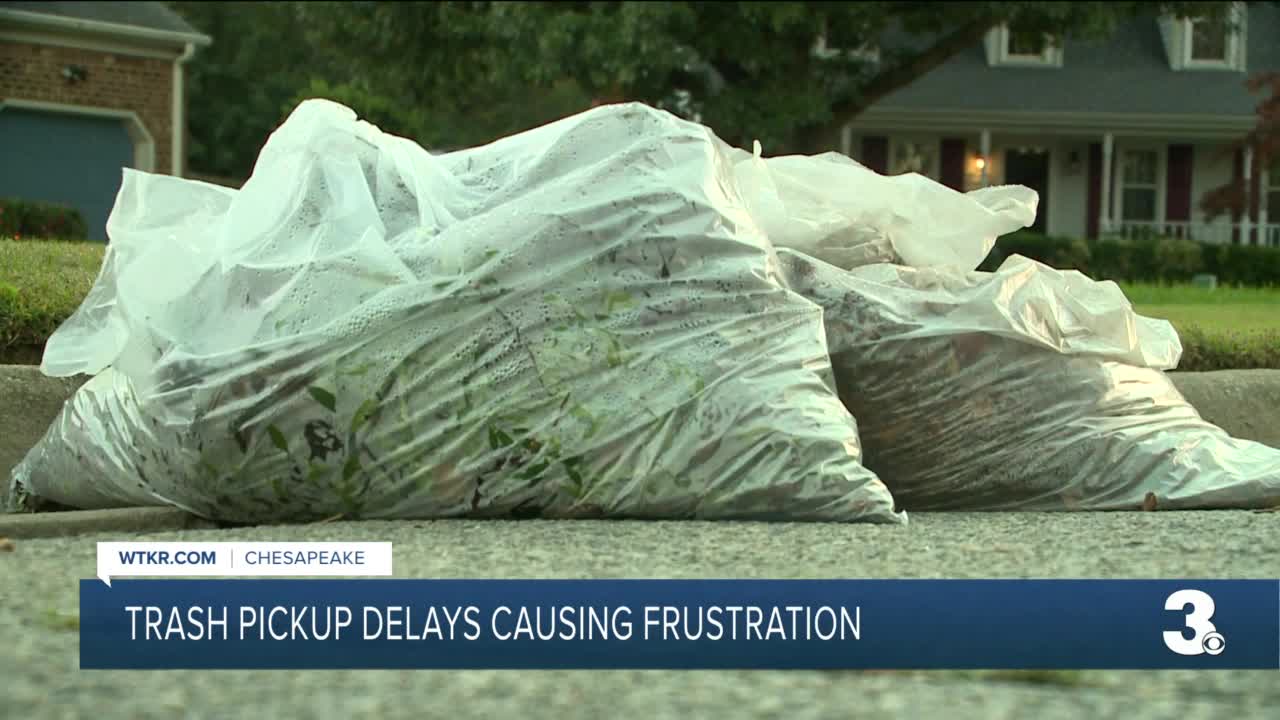Trash Pickup Delays: Impact Of Snow And Ice On Friday School Schedules

Table of Contents
The Impact of Snow and Ice on Trash Collection Services
Snow and ice significantly hinder trash collection services, creating a domino effect that impacts many aspects of community life, especially Friday school schedules. The challenges are multifaceted, stemming from reduced road accessibility, safety concerns for sanitation workers, and equipment malfunctions.
Reduced Road Accessibility
Garbage trucks, large and heavy vehicles, struggle immensely on icy roads and snow-covered streets. Navigating these hazardous conditions presents significant difficulties:
- Increased risk of accidents: Slippery surfaces increase the likelihood of accidents, potentially leading to damaged vehicles, injuries, and delays in service.
- Limited truck maneuverability: Snow and ice reduce traction, making it difficult for garbage trucks to maneuver, especially in tight spaces or on residential streets. This can lead to missed pickups and delays in the collection route.
- Longer routes due to road closures: Snowstorms often result in road closures, forcing garbage trucks to take longer, more circuitous routes, further delaying collection times.
Safety Concerns for Sanitation Workers
Sanitation workers face significant safety risks during winter weather conditions. The hazards include:
- Slip-and-fall accidents: Icy surfaces increase the risk of slip-and-fall accidents, leading to injuries and lost workdays.
- Exposure to cold weather: Prolonged exposure to freezing temperatures can lead to hypothermia and other cold-related illnesses.
- Strain from clearing snow around bins: Sanitation workers often need to manually clear snow and ice around garbage bins before collection, leading to physical strain and increased risk of injury.
Equipment Malfunctions
Cold temperatures significantly impact the functionality of garbage trucks:
- Hydraulic system failures: Freezing temperatures can cause hydraulic system failures, rendering essential truck functions inoperable.
- Frozen fluids: Fluids vital to the truck's operation, such as engine oil and transmission fluid, can freeze, hindering performance.
- Battery issues: Cold weather significantly impacts battery performance, leading to difficulty starting the trucks or powering essential systems.
The Ripple Effect: Trash Pickup Delays and School Schedules
Delays in trash pickup directly impact Friday school schedules, leading to various challenges and disruptions.
Potential for School Closures
Overflowing bins and unsanitary conditions created by delayed garbage collection pose significant health and safety risks, potentially leading to school closures:
- Health risks: Accumulated trash can attract rodents and other pests, posing health risks to students and staff.
- Safety concerns: Overflowing bins can create obstacles and hazards on school grounds.
- Disruption of school activities: School closures disrupt the educational process, extracurricular activities, and the overall school routine.
Logistical Challenges for Schools
Delayed trash collection presents logistical headaches for school administrators, particularly on Fridays:
- Managing waste buildup: Schools must find ways to manage accumulating waste until garbage collection resumes.
- Scheduling cleanup: Extra staff and resources might be required to address sanitation issues resulting from delayed pickup.
- Coordinating with sanitation services: Schools need to maintain consistent communication with sanitation departments to address the issue and schedule makeup collections.
Impact on After-School Activities
Trash pickup delays often impact after-school events and activities:
- Cancellations: Events may need to be canceled due to unsanitary conditions or safety concerns.
- Rescheduling: Activities may need to be rescheduled, disrupting students' and staff's schedules.
- Disruption to extracurriculars: Delays can affect practices, games, and other extracurricular activities.
Mitigation Strategies for Schools and Municipalities
Proactive measures can minimize the impact of trash pickup delays on school schedules:
Improved Communication
Clear and timely communication between sanitation departments and schools is crucial:
- Early warning systems: Sanitation departments should establish systems to alert schools of potential delays due to inclement weather.
- Automated notifications: Automated notifications via email or text message can ensure timely communication.
- School websites and social media updates: Schools should utilize their websites and social media channels to share updates with parents and staff.
Alternative Waste Management Strategies
Temporary adjustments can help manage waste during periods of delayed collection:
- Larger bins: Using larger bins can help accommodate increased waste volume.
- Designated collection areas: Establishing designated areas for temporary waste storage can improve organization and safety.
- Temporary storage solutions: Schools may need to explore temporary storage solutions, such as renting additional dumpsters.
Preemptive Snow Removal
Prioritizing snow removal near schools and waste collection routes is essential:
- Strategic snow plowing: Focusing snow removal efforts on school areas and garbage collection routes ensures easier access for sanitation trucks.
- Salt application: Applying salt or other de-icing agents can improve road conditions and prevent ice formation.
- Preemptive road clearing: Proactive road clearing before a storm can prevent significant accumulation of snow and ice.
Conclusion
Trash pickup delays caused by snow and ice significantly impact Friday school schedules. The disruption to garbage collection creates logistical challenges for schools, potentially leading to closures or disruptions to after-school activities. Effective communication between municipalities and schools, along with proactive waste management strategies and preemptive snow removal, are essential to mitigate these challenges. By understanding the interconnectedness of these factors, we can better prepare for winter weather and minimize the disruption to both trash collection services and the educational environment. Remember to check your local municipality's website for updates on trash pickup delays and potential school closures due to inclement weather. Stay informed and prepared for potential garbage collection disruptions this winter!

Featured Posts
-
 Meer Dan Duizend Limburgse Ondernemers Wachten Op Aansluiting Enexis
May 02, 2025
Meer Dan Duizend Limburgse Ondernemers Wachten Op Aansluiting Enexis
May 02, 2025 -
 Xrp Price Surge After Ripple Settlement A Detailed Analysis Of The 50 M Deal
May 02, 2025
Xrp Price Surge After Ripple Settlement A Detailed Analysis Of The 50 M Deal
May 02, 2025 -
 Splitting Keller Isd A Step Backwards For Progress And Unity
May 02, 2025
Splitting Keller Isd A Step Backwards For Progress And Unity
May 02, 2025 -
 Fortnite X Sabrina Carpenter When And Where To Play
May 02, 2025
Fortnite X Sabrina Carpenter When And Where To Play
May 02, 2025 -
 Unlocking Growth Saudi Arabias Revised Abs Market Regulations
May 02, 2025
Unlocking Growth Saudi Arabias Revised Abs Market Regulations
May 02, 2025
